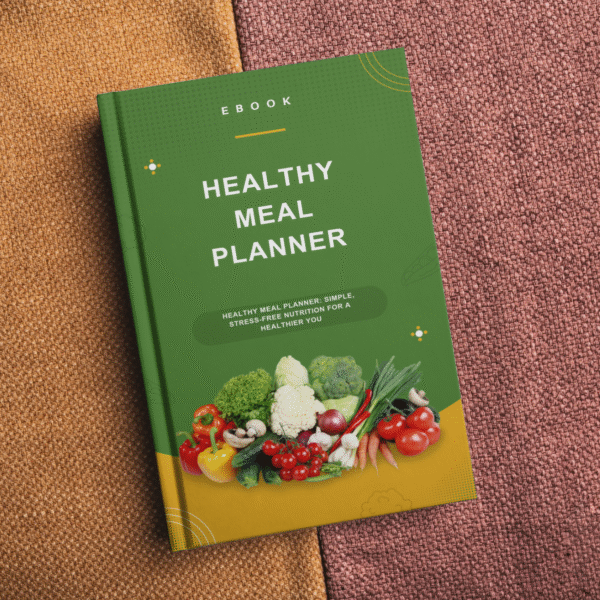Description
Healthy Meal Plan: Your Guide to Simple and Nutritious Eating
Eating healthy can feel overwhelming, but a healthy meal plan simplifies the process. It helps you save time, eat better, and feel your best. Whether you want to lose weight, gain energy, or just eat balanced meals, having a plan makes a difference.
What is a Healthy Meal Plan?
A healthy meal plan is a guide that outlines what to eat for each meal. It focuses on balanced nutrition, portion control, and variety. A good plan includes vegetables, fruits, proteins, whole grains, and healthy fats.
Planning meals ahead reduces stress. You don’t have to decide what to eat last minute. Instead, you follow a structured approach that keeps your diet consistent and nutritious.
Benefits of a Healthy Meal Plan
Following a healthy meal plan has several benefits:
- Saves time and money: Planning meals prevents last-minute takeout and grocery overspending.
- Improves health: Balanced meals supply essential nutrients and reduce cravings.
- Supports weight management: Portion control and nutritious foods help maintain a healthy weight.
- Boosts energy: Regular, balanced meals prevent energy dips during the day.
- Reduces stress: Knowing what to eat each day eliminates mealtime uncertainty.
By sticking to a plan, you can form long-lasting healthy eating habits.
How to Create a Healthy Meal Plan
Creating your own meal plan is simpler than it sounds. Here’s a step-by-step guide:
1. Assess Your Needs
Consider your goals, lifestyle, and dietary restrictions. Are you aiming to lose weight, build muscle, or just eat more balanced meals?
2. Choose Nutrient-Rich Foods
Pick foods high in vitamins, minerals, and fiber. Include vegetables, fruits, lean proteins, whole grains, and healthy fats.
3. Plan Balanced Meals
Each meal should have protein, carbs, and healthy fats. Balance keeps you full and maintains energy levels.
4. Prep in Advance
Prepare ingredients or cook meals ahead. Meal prep saves time and makes it easier to stick to the plan.
5. Track and Adjust
Monitor your energy levels, weight, and mood. Adjust portions or swap foods if needed.
Sample Healthy Meal Plan
Here is an example of a simple daily plan:
Breakfast: Oatmeal with berries and a spoon of peanut butter
Snack: Greek yogurt with sliced banana
Lunch: Grilled chicken salad with olive oil and lemon dressing
Snack: Carrot sticks with hummus
Dinner: Baked salmon, quinoa, and steamed broccoli
This plan provides protein, fiber, healthy fats, and essential nutrients. You can rotate meals to avoid repetition.
Tips for Sticking to a Healthy Meal Plan
- Keep it simple: Use easy recipes and common ingredients.
- Batch cook: Prepare meals for 2-3 days to save time.
- Stay flexible: Swap meals or ingredients to prevent boredom.
- Use leftovers: Reinvent leftovers into new dishes.
- Stay hydrated: Drink water throughout the day to support digestion and energy.
Consistency is key. Even small steps add up to long-term results.
Common Mistakes to Avoid
- Skipping meals, which can cause overeating later
- Relying on processed foods or sugary snacks
- Following overly strict plans that are hard to maintain
- Ignoring portion sizes or balance
A healthy meal plan should be practical, flexible, and enjoyable.
Why Your Healthy Meal Plan Works
Your healthy meal plan provides structure, clarity, and motivation. By following a plan, you reduce stress and make healthier choices naturally. Over time, it becomes a lifestyle rather than a temporary diet.
Transitioning to healthy eating is easier with clear guidance. The plan ensures you get essential nutrients, avoid unhealthy cravings, and maintain steady energy.
Conclusion
A healthy meal plan is more than a list of meals. It is a tool for better health, energy, and life balance. By planning, prepping, and eating mindfully, you take control of your nutrition. With consistency and simple strategies, you can enjoy tasty, balanced meals every day.
FAQ About Healthy Meal Plans
Q1: Can a healthy meal plan help me lose weight?
Yes. Balanced meals and portion control help reduce calories without sacrificing nutrition.
Q2: Do I need to follow it strictly every day?
No. Flexibility is important. Use it as a guide, not a rigid rule.
Q3: How long should I follow a meal plan?
You can follow it indefinitely. Adjust meals based on your goals and preferences.
Q4: Is it expensive to follow a healthy meal plan?
Not necessarily. Planning meals reduces waste and helps you shop smart.
Q5: Can I customize it for dietary restrictions?
Absolutely. A good plan can accommodate vegetarian, vegan, gluten-free, or low-carb diets.









Reviews
There are no reviews yet.